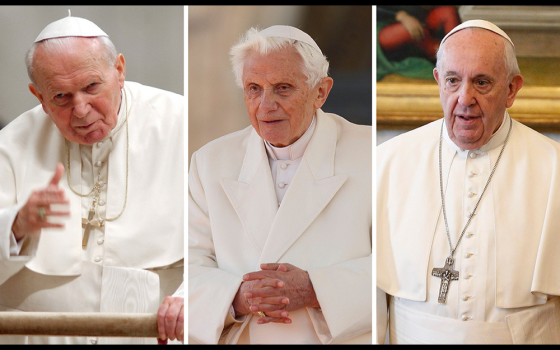Two weeks ago, I criticized Archbishop Charles Chaput for, among other things, publishing a reflection on the current political situation that seemed to go further than it is prudent for a bishop to do. This weekend, Sen. Tim Kaine decided to offer the thought that the Catholic church would change its teaching on gay marriage, also crossing a line politicians are well advised not to cross. In both cases, they did not stay in their own lane and confused the distinction between being a politician and being a prelate.
Fifty-six years ago, Sen. John Kennedy spoke to the Houston Ministerial Association and delivered a full-throttled "Wall of Separation" between politics and religion interpretation of the relationship between the two:
I believe in an America that is officially neither Catholic, Protestant nor Jewish; where no public official either requests or accept instructions on public policy from the Pope, the National Council of Churches or any other ecclesiastical source; where no religious body seeks to impose its will directly or indirectly upon the general populace or the public acts of its officials, and where religious liberty is so indivisible that an act against one church is treated as an act against all.
We liberals like grey, and there was no grey in Kennedy's speech. Certainly, no one thinks a politician should request "instructions" from the pope or the National Council of Churches, but why not guidance? And, if a politician believes what her church teaches, why should she not pursue the implementation of those beliefs with the same vigor with which a non-believer pursues political outcomes that cohere with his secularly grounded values? We have come to understand that there is no putatively neutral moral space, that all political debates imply a set of moral values and indeed certain ontological understandings: Does one value freedom before truth or truth before freedom, and how are the two related? The second you try and answer such questions, you are in the realm of value judgments, not scientific analysis.
Kennedy's speech had a political objective: He wanted to assure a roomful of Baptists that he viewed separationism the same way they did. We will never know what Kennedy really thought about his religion: When told that someone was writing a book about his religion, Kennedy's sister said, "That is going to be a short book." And, we know that the children of those Baptist ministers were less fond of separationism 20 years on, when they formed the Moral Majority.
The problem with Archbishop Chaput's column was not that he, as a bishop, is not permitted to have political views. It is that speaking them openly casts himself in the role of political pundit, which he is not, and using the equivalent of office stationery to propagate those views gives them a kind of ecclesial sanction they do not deserve. Inevitably, no matter how many times he qualifies his statements, they are seen to be share in his episcopal authority in some way and, just so, they usurp the role of the laity.
But, don't take my word for it. This weekend, Cardinal Donald Wuerl published an excellent essay in his diocesan paper. The cardinal recalled a priest who used to devote his column in the church bulletin to political musings. "[The pastor's] justification, which his congregation found quite unpersuasive, was that he was writing simply as an American citizen, not as their pastor. But he was their pastor, using the parish's bulletin which was distributed to all who came to Mass," Wuerl writes. "Sometimes, I fear there can be a temptation to substitute sharing our political and ideological preferences for the very demanding and challenging role of teaching by word and example the principles of our faith. I believe our efforts to preach and persuade are more credible and effective than proclaiming our own political opinions." The cardinal also made a convincing case that it is role of the laity to take the political baton and make their convictions felt in the political arena. Too often, Wuerl notes, people complain that "The Church should do something" or "say something" by which they mean the bishops, but it is the lay faithful who are primarily called upon to do and speak in the political arena. The bishops form consciences. They teach the faith.
Sometimes it is the politician who jumps into a lane he shouldn't be in. The other night, Sen. Tim Kaine decided to try on his theological drag when he spoke to a gala for the Human Rights Campaign Fund. He mused that the Catholic church might change its teaching on gay marriage someday. And the justification for this speculation? He did not say. More importantly, I would defend Kaine if he had said that it is the civil definition of marriage that appropriately includes gays, but declined to say anything about a religious person's or institution's stance on the issue because these latter stances were informed by their theology, and he is a politician not a theologian. And, if he wants to join a conversation over coffee at his parish on the topic, fine. But, a little restraint when addressing theological topics from a political podium is not too much to ask.
My fear is that Kaine is not alone in thinking that accepting same sex marriage is something the church will do and that it will be fairly easy to do. This is not like women's ordination, in which there is nothing in the tradition to justify but also nothing to impede it because the issue never came up until recently. On marriage, there is explicit teaching over centuries. It is all well and good to note, correctly, that until recently, the culture and the church both thought of homosexuality as an aberrant and sinful choice, and that only now do we recognize homosexuality as something experienced as a given, as something constitutional, not a choice. There are implications, obviously, for our teaching on homosexuality. The best book on the topic, Fr. Lou Cameli's Catholic Teaching on Homosexuality, points to some steps the church can take, but those steps are far short of rewriting our teaching on marriage. Cameli's book is good in part because it recognizes how modest we should be about our expectations. If it can be done, and it is a big if, it will take a lot of theological work that has not been done yet.
Back to the plot. There are no more strict separationists, to be sure. But, that does not mean distinctions between politics and religion are useless. Bishops and clergy should stay in their lane, teach the faith and leave the political speculation to others, because otherwise they usurp the role of the laity and crowd out space needed to form consciences. They also run the risk of looking foolish because they might not know what they are talking about. Politicians most certainly should explain how their values inform their policies, and the sources from which they derive their values, including their faith, but they are well advised to leave the theology specifics to others. The collapse of the two realms has never brought anything but grief to both. Thirty-six years after the formation of the Moral Majority, now is a good time to create some more distance between the two realms and scrutinize the connections between them with intelligence and learning.
[Michael Sean Winters is NCR Washington columnist and a visiting fellow at Catholic University's Institute for Policy Research and Catholic Studies.]


